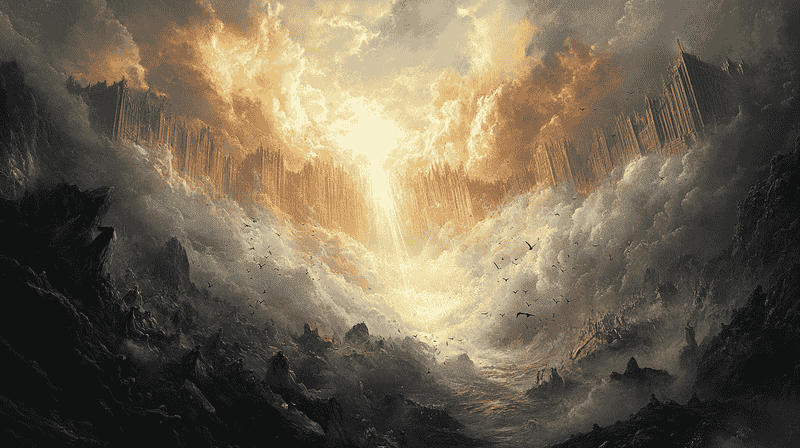Biblical Perspective on the Earth’s Age
When it comes to understanding the age of the Earth from a biblical perspective, there are two main views that Christians often discuss: Young Earth Creationism and Old Earth Creationism. Both are rooted in faith and Scripture, but they approach the timeline of creation in different ways.
Young Earth Creationism
Young Earth Creationism is one of the most straightforward interpretations of the Bible. It’s based on a literal reading of the creation story in Genesis. According to this view, God created the world in six days, and those six days are understood as 24-hour periods. By tracing the genealogies in the Bible—like those in Genesis, Chronicles, and Luke—young Earth proponents estimate that the Earth is around 6,000 to 10,000 years old.
A well-known figure in this view is Archbishop James Ussher, a 17th-century scholar who calculated the Earth’s creation to have occurred in 4004 BC. His calculations were based on adding up the ages of people listed in the Bible, starting with Adam. For many Christians who hold this view, the literal six days of creation and the genealogical timeline affirm God’s direct and intentional hand in shaping the world.
Young Earth Creationists often talk about the importance of taking God’s Word at face value. For them, the creation story isn’t just a poetic account but a historical record of how the universe began. They believe that accepting a young Earth aligns with a high view of Scripture and trust in its authority.
Old Earth Creationism
Old Earth Creationism takes a different approach. Christians who hold this view still believe that God is the Creator of everything, but they interpret the six days of creation in Genesis differently. Instead of 24-hour days, they see these “days” as symbolic or representative of much longer periods of time—possibly millions or billions of years.
One common idea within Old Earth Creationism is the Day-Age Theory, which suggests that each “day” in Genesis represents an era or age. This perspective points out that the Hebrew word for “day” (yom) can mean a literal day but also a longer, undefined period of time, depending on the context. For example, Psalm 90:4 says, “A thousand years in your sight are like a day that has just gone by,” which some interpret as a clue that God’s timeline might not match our human understanding of time.
Another interpretation is the Gap Theory, which proposes that there’s a long gap of time between Genesis 1:1 (“In the beginning, God created the heavens and the earth”) and Genesis 1:2. This gap could account for an old Earth, with millions or billions of years passing before God began His six days of creation as described in the rest of the chapter.
Old Earth Creationists often see their view as a way to bridge the Bible’s creation account with modern scientific evidence for an older Earth. They emphasize that Scripture and science don’t have to be at odds, and that understanding God’s creation can be a journey of faith and discovery.
What Both Views Share
Although these views differ on timelines, they share a key foundation: belief in God as the Creator. Both Young Earth and Old Earth Creationists affirm that the universe didn’t happen by chance—it was intentionally designed by a loving and powerful God. The differences in interpretation reflect the richness of Scripture and the diversity of thought within Christianity.
At the heart of these discussions is a shared desire to honor God and His Word. Whether you lean toward a young Earth or an old Earth, the ultimate focus is on the beauty, complexity, and purpose of God’s creation.

Science vs. Scripture
So, what happens when science enters the conversation? For many Christians, it can feel like walking a tightrope. You need to balance a commitment to Scripture with the vast body of evidence presented by modern science. Tough? Maybe not.
Scientists estimate the Earth to be about 4.54 billion years old, based on methods like radiometric dating of rocks and minerals. That’s a far cry from the 6,000 to 10,000 years suggested by a literal reading of the Bible. So, how do we make sense of this?
Over the past century, advances in geology, astronomy, and physics have given us detailed tools to study the Earth’s history. Radiometric dating, for example, measures the decay of radioactive isotopes in rocks, which actually provides highly consistent estimates for the Earth’s age. Scientists also look at the layers of rock in the Earth’s crust (called strata), which reveal a timeline of events stretching back billions of years.
What Does This Mean For Faith?
Now, does this mean Christians have to throw out their Bibles? Nope. Many Christians believe it’s possible to embrace scientific findings while still holding firmly to their faith. Some see science as a way to marvel at the complexity of God’s creation—a glimpse into the “how” of His work, while the Bible focuses on the “why.”
This is where the conversation often shifts to interpretation. For example, if you view the six days of creation as symbolic (like in Old Earth Creationism), the scientific timeline fits more comfortably with Scripture. In this way, science and the Bible aren’t enemies. They’re two sides of the same coin, each offering insights into God’s handiwork.
That said, there are Christians who question the reliability of modern science, particularly when it contradicts a literal interpretation of Scripture. They argue that radiometric dating and other methods are based on assumptions that might not always hold true. For these believers, the Bible is the ultimate authority, and any discrepancies with science are seen as a matter of trust in God’s Word over human understanding.
But here’s the thing: not every Christian sees this as a battle. Many recognize that faith and science can complement each other. After all, the Bible isn’t a science textbook—it’s a spiritual guide that reveals who God is and how He relates to His creation. It answers questions about purpose, meaning, and salvation, while science explores the mechanics of how the physical world operates.
In the end, how Christians approach this tension often comes down to perspective. Some focus on defending a young Earth as a way of upholding biblical authority. Others are comfortable exploring ways to harmonize the Bible with scientific discoveries. And some are okay with leaving the question open, trusting that God’s truth will remain, even if we don’t have all the answers yet.
What’s important is that this isn’t a dealbreaker for faith. Whether you lean more toward Scripture, science, or a bit of both, the key is staying rooted in God’s Word and recognizing that the beauty and wonder of His creation—however old it may be—ultimately point back to Him.
Get Closer to God Today
4.9
Average Rating
|Over 5 Million Downloads
Historical Interpretations by Christian Thinkers
Christians have been pondering the age of the Earth for centuries, and the discussion isn’t just a modern one. Early Christian thinkers didn’t always approach Genesis the way we do today, and their interpretations can give us some valuable insights into how Scripture has been understood over time.
Saint Augustine, Origen, Thomas Aquinas
Take Saint Augustine, for example. Writing in the 4th and 5th centuries, he believed that the six days of creation in Genesis weren’t necessarily literal days. In his book The Literal Meaning of Genesis, Augustine suggested that God’s creation might have happened all at once, with the six “days” being a way to help human minds understand the process. He argued that Genesis wasn’t written to give a scientific account but to reveal God’s power and purpose. Augustine’s focus was less on timelines and more on the deeper truths about God and creation.
Origen, another early church father, shared a similar perspective. Living in the 2nd and 3rd centuries, he also emphasized that parts of Genesis might be symbolic rather than literal. Origen believed that some parts of Scripture were written in a way that invited deeper reflection and spiritual understanding, rather than being a straightforward historical narrative.
Moving forward in history, the Middle Ages brought scholars like Thomas Aquinas into the conversation. Aquinas didn’t directly address the Earth’s age, but he emphasized that faith and reason are compatible. He believed that God’s truth is revealed both in Scripture and in the natural world, laying the groundwork for later Christians to explore scientific discoveries without abandoning their faith.
A Shared Legacy of Faith
These early thinkers remind us that Christians have always approached Genesis with a mix of faith and thoughtfulness. Some took the creation story as literal, while others saw it as poetic or symbolic. What they all had in common, though, was a desire to understand God’s Word in a way that deepens faith and brings glory to Him.
The historical diversity of views also shows that debates about the Earth’s age aren’t a modern invention. Christians throughout history have wrestled with how to interpret Genesis, and their writings encourage us to approach the topic with humility and a willingness to learn.
So, whether you find yourself leaning toward a young Earth, an old Earth, or somewhere in between, you’re not alone. Christians have been exploring these questions for centuries, and their reflections can inspire us to keep seeking God’s truth in both Scripture and creation.





